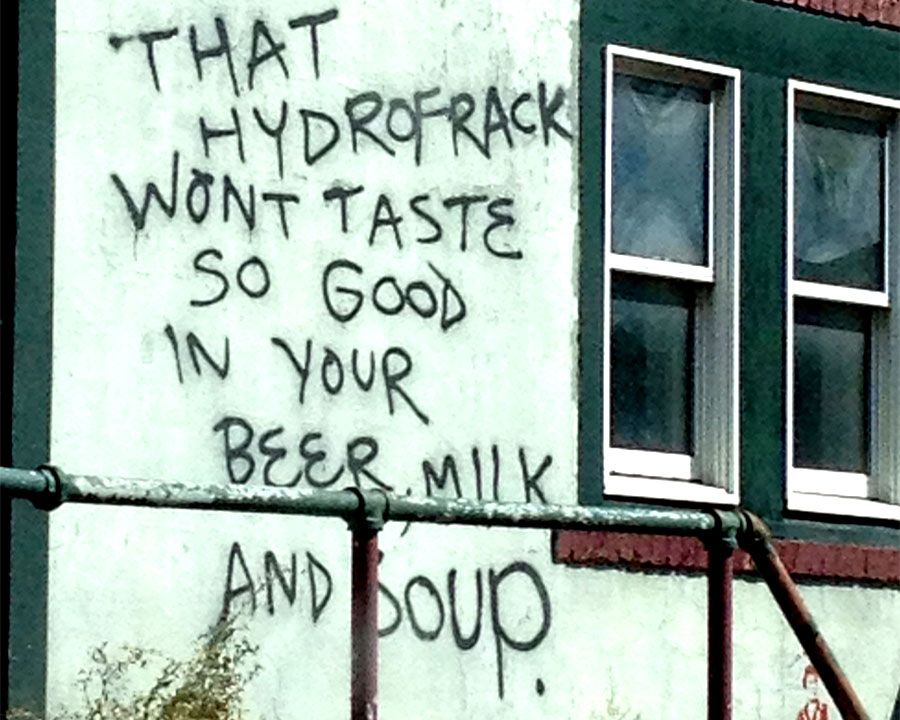
Is Chris Faulkner, the CEO of Breitling Oil & Gas, the perfect messenger for fracking’s future — or the most frightening man in the industry?
It depends on your perspective. Joyce Hunt, co-owner of Hunt Country Vineyards on Keuka Lake, considers Faulkner the latter. “He’s so slick, a lot of people will probably believe what he says,” Hunt told me. “That’s what’s so frightening.”
Hydrofracking has never had a spokesman as effective as Faulkner. He’s become known as the energy CEO who will go after his own industry for failling to communicate effectively with the public. Faulkner, in previous interviews, has slammed energy companies over their secrecy. He says the public deserves to know everything that goes into fracking fluid, including the chemicals than can be toxic. He doesn’t blame people for harboring suspicions over fracking.
I had the chance to interview Faulkner in two segments as part of my job as morning anchor for 13 WHAM News in Rochester. Here are some of the quick takeaways:
- Most significantly, Faulkner says we’re perhaps two years away from being able to replace toxic chemicals in frack fluid with natural materials — the kinds you can eat without getting sick. I asked why we don’t just wait until we achieve that advancement, if it’s so close. He didn’t really answer the question, but clearly he wants fracking now.
- Faulkner concedes the point that a significant portion of the gas acquired via fracking will be sent to Europe. However, he says this is only because gas is so cheap domestically that he has to sell some of it overseas to sustain the domestic sales.
- Regarding trucking and threats to the landscape, Faulkner claims that recent developments would greatly lessen the local footprint.
There’s much more in the interviews, which I encourage you to watch right here:
I asked Joyce Hunt to respond to Faulkner’s points. Here are some of her remarks. We encourage thoughtful discussion in the comments section.
On Fracking History
“Chris Faulkner stated that fracking has been done since 1941. This statement is purposefully misleading. Faulkner is referring only to LOW volume (less than 80,000 gallons of water used) fracking in single vertical wells prior to 1999, not high-volume, slick-water horizontal hydraulic fracturing. This is a practice that has only been used in the last 12-15 years.”
On Faulkner’s Claim that Because Companies Put More Wells on a Single Site, the Number of Trucks is Cut Down
“Another misleading statement. The fact that current hydrofracking creates over 1,000 times more volume of waste means that the impact on roads is increased by over 1,000 times. The concentration of wells in an area means that fewer roads receive an even larger increase in truck traffic.”
On the Potential for Non-Toxic Fracking Fluids
“This appears to be an admission that hydrofracking is not safe now. In the past, gas companies have insisted that people whose health or water was negatively impacted by gas drilling sign non-disclosure agreements in order to receive settlements to be able to pay for healthcare, obtain clean water by having it delivered, and sometimes to relocate… All this begs the question, if fracking can be done safely in two years, why not wait? Specifically, why shouldn’t Governor Cuomo delay licensing new wells until the process can be proven safe?”
On the Idea that Fracking Produces Cleaner Energy than Coal and Other Sources
“In truth, the gas itself may burn cleaner, but the process of obtaining the gas is every bit as dirty and destructive to the environment as coal.”
On Faulkner’s Contention that Natural Gas is Very Cheap in the U.S.A.
“Once the trucks, buses and taxis are converted to run on compressed natural gas, what guarantee do the American people have that the price won’t shoot up because the gas is going to foreigners at a higher price? Supply and demand would lead us to believe that the price will rise, while we the taxpayers get to subsidize the transition of buses and taxis to use compressed natural gas.”
On the Size of Wells
“Chris Faulkner said that the size of a well site is five acres and that wouldn’t have much effect on the average farm in the US, which he says is 1,000 acres. The average farm in New York is closer to 100-200 acres. According to the American Petroleum Institute, the average hydrofracking well site is 6-10 acres. Additional acreage is used for retention ponds, roads, pipeline, compressor stations, and more. It will ruin most New York farms. Again, Faulkner has resorted to only telling part of the story and misleading the public.”
On the Safety of the Hydrofracking Process
“According to Mr. Faulkner, all of the frack water returns to the surface. The API figures are 20-50% retrieval of fracked water. Faulkner claimed that all the fracked water is recycled. Industry figures as of December 2011 put the rate of recycling at about 20%, with a few companies doing better.
“Also, according to Faulkner, the steel casing surrounded by cement eliminates all risk of contaminating wells and aquifers. Industry statistics show 6% of wells fail within the first year of operation and 50% fail within 30 years. Fracking a mile down doesn’t poison the water wells; the faulty well casings do.”

